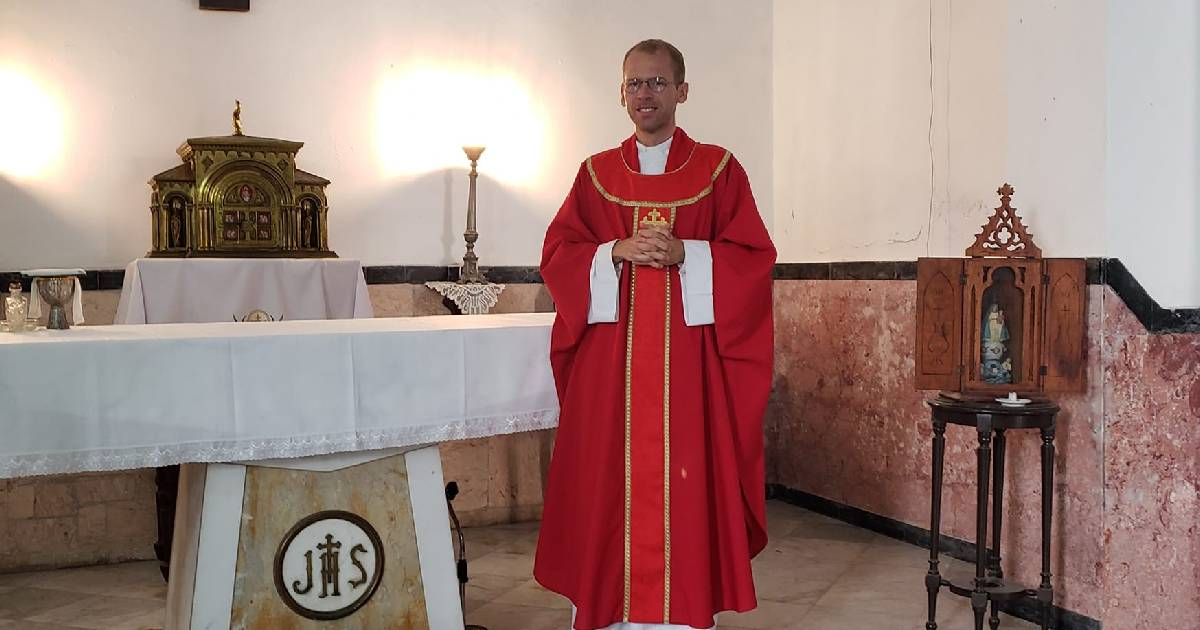The Cuban priest Kenny Fernández Delgado has shared details about a recent interrogation by State Security officials. The questioning aimed to intimidate him over his social media posts and his call for a family prayer event in parks across cities for Cuba and Venezuela on Saturday, August 3rd.
In a Facebook post, the priest informed that, according to the Department of Immigration and Foreigners, it is a dual offense to organize prayers in parks or public spaces. Fernández Delgado elaborated on why the citation from State Security was routed through the Immigration Department, attributing it to the rental of a small apartment to Cubans, managed by someone else.
"The mere possibility that I might someday rent the apartment to a foreigner gives the Immigration Department the authority to summon me as many times as they want, even with less than 24 hours' notice and at least once every six months, without needing to present an official citation document," the priest explained.
Although he clarified that he has no intention of renting to foreigners, the officials were not convinced. "I realized that the Immigration Department, among other functions, does the same as State Security (G2) generally does with all citizens but focused on landlords: repress anyone who thinks differently from what they call the revolution and harass them repeatedly until they are silenced, or take as many repressive measures as necessary to silence them," he summarized.
Government Tactics to Suppress Public Prayer
Fernández Delgado also exposed the regime's tactics to prevent his participation in the public prayer invitation he had proposed. "They finally said that only convocations within churches, places of worship, are allowed. But we know that anything they imagine could be against the revolution can and has been repressed as well," he denounced.
He also highlighted a revealing comment made by the officer who attended his citation, a "Lieutenant Colonel who spoke 'amicably'". "All self-employed workers are state (government) workers. Therefore, they must comply with all 'state' laws like any state worker, meaning they cannot engage in activities considered contrary to the revolution, such as posting critical messages about the revolutionary process or its allies on social media. This is a significant revelation because it means that in Cuba, regardless of working in non-state management forms, you are a state worker, essentially a government worker," he stated.
Last week, the Cuban priest wrote on the social network X that "around 9:45 p.m., almost an hour ago, an Immigration official called me for an appointment at 19 and K at precisely 10:00 a.m. Later, a Lieutenant Colonel called me to say there would be consequences if I didn't go. Whatever happens to me, we will all be united in prayer."
A few days earlier, in a Facebook statement, he said, "praying in a park is not prohibited" and invited everyone to join in prayer "without signs, without slogans, without any leader other than Jesus Christ and, above all, without fear." The call to prayer includes the flexibility for each person to pray as they prefer, whether silently or using known prayers like the rosary. "Jesus Christ will help us if we ask with faith," the priest affirmed, using the hashtag #OremosEnFamilia to promote the initiative.
Understanding the Repression of Public Prayer in Cuba
Here are some questions and answers that provide further insight into the Cuban government's repression of public prayer initiatives and the implications for religious freedom in the country.
Why did the Cuban government summon Kenny Fernández Delgado?
The Cuban government summoned Kenny Fernández Delgado because of his social media posts and his call for a public prayer event in parks for Cuba and Venezuela. They used the pretext of his potential rental to a foreigner as a reason for the citation.
What is the significance of the Department of Immigration and Foreigners' involvement?
The involvement of the Department of Immigration and Foreigners suggests that the Cuban government is using various bureaucratic means to intimidate and repress those who express views contrary to the regime, even if those means are seemingly unrelated to the individual's actions.
What does the Cuban government's stance on self-employed workers imply?
The Cuban government's stance implies that all self-employed workers are essentially considered state workers and must comply with state laws, including restrictions on activities deemed contrary to the revolution. This highlights the lack of true independence for private sector workers in Cuba.
